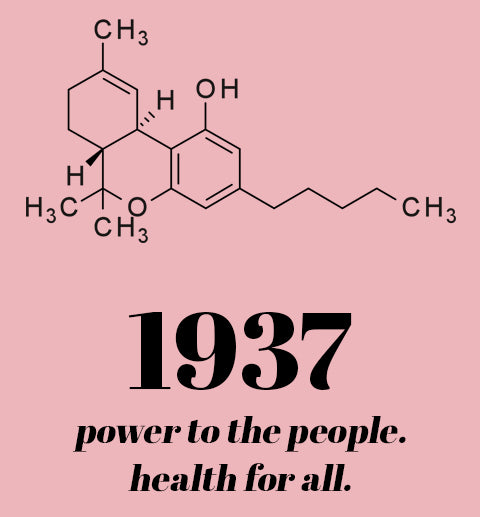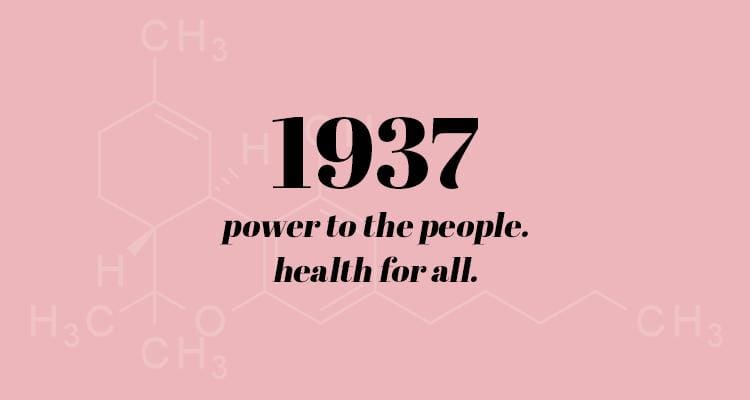CBD and GABA: An Introduction

Maybe you weren’t aware of this, but GABA (gamma-aminobutyric acid) is constantly working behind the scenes to pump the breaks when neurons in your brain get overexcited. This naturally occurring amino acid is one of your most important neurotransmitters. So, when there’s not enough of it...you can tell.
GABA deficiencies can feel like anxiety, racing thoughts, stress, fear, and can even make it harder to sleep. Luckily, CBD (cannabidiol) may not only help with those symptoms, but it may normalize GABA production too! Keep reading to find out how CBD and GABA can work together to keep you fit and healthy.
What Is GABA?
First, we need to do a teeny, tiny biology review--we’ll keep it short, we promise. Specifically, we’re focusing on Neurobiology: the study of the brain and nervous system and how they generate sensations, perception, movement, learning, emotion, and several other functions.
The nervous system has billions of neurons that send information to other nerve cells, muscles, or gland cells, and they each have three parts: a cell body, axon, and dendrite. As you can see from the image below, axons extend from the body and branch out into nerve terminals that allow them to send messages to other neurons. Dendrites also extend from the body, but by receiving messages from the axons of other neurons.
The contact point between the axon of one neuron and the dendrite of another is called the synapse. To send a message from one neuron to another, an electrical impulse is sent through the axon. But neurons can’t exactly send text messages, so they rely on neurotransmitters. These chemical messengers fall into three categories (excitatory, inhibitory, or modulatory) and can influence several different physical and psychological functions. Everything from mood, heart rate, appetite, and sleep can all be affected by neurotransmitters.
GABA is an inhibitory neurotransmitter that pumps the brakes on excitatory neurotransmitters. While that may seem pretty simple, its role is far more complex than it sounds.
Why Is GABA Important?
GABA, as you may have guessed by now, inhibits or reduces the activity of neurons or nerve cells. But why would you want to stop your nerve cells? Doesn’t that sound like the opposite of what you want?
Not at all! Close to forty percent of the brain synapses have GABA receptors since it works hand in hand with so many other brain functions.
For example, dopamine (another neurotransmitter) is associated with happiness and rewards. A tiny bit of dopamine gets released when we eat something, the purpose of which is to teach us to feed ourselves. Pretty simple.
Too much dopamine, or if there’s not enough GABA to inhibit dopamine, can impact cognitive control (racing thoughts), impulse control, working memory, or attention control. This is very common in attention disorders like ADD or ADHD.
Normally, the brain balances these neurotransmitters. However, there are a surprisingly large number of ways that they can become unbalanced. For some, it’s genetic or stress-related. For others, it’s because they’ve altered their brain chemistry through the use of particular substances (legal and/or illegal substances).
Someone who doesn’t have enough GABA may experience anxiety, racing thoughts, depression, difficulty concentrating, insomnia, and, in more severe cases, seizures.
How To Naturally Boost GABA Levels
There are several different ways to boost your GABA levels naturally, but sometimes people need to resort to prescription medications. Before it gets to that point though, it’s always best to try the natural methods.
Boost GABA With Food
- Fermented foods like sauerkraut, kimchi, and yogurt
- Lentils
- Oats
- Potatoes
- Almonds and Walnuts
- Cherry Tomatoes
- Bananas
Balance Neurotransmitters by De-Stressing

Balance Neurotransmitters with Exercise
GABA and Benzodiazepines
Sometimes the natural options aren’t enough to boost GABA levels and people need to be prescribed a Benzodiazepine like Xanax, Ativan, Klonopin, or Valium. They don’t actually increase the amount of GABA in your system, but they do make the GABA that’s already there more effective. The effects of benzos can include sedation, muscle relaxation, and reduced anxiety so they’re often used to treat anxiety or insomnia.
However, there are several drawbacks to these medications. Over time they’re less effective because the brain adjusts to them. This can lead to higher and higher doses, which puts people at risk of becoming dependent. Not only that, but regular side-effects include lack of coordination, feelings of depression, drowsiness, and dizziness (and withdrawals from them are brutal).
So, while these medications can offer short-term relief when people desperately need it, they’re not meant to be used long term. However, there’s more and more research coming to light indicating that CBD could be an alternative for benzos and that it could boost GABA levels.
How Does CBD Affect GABA?
Let’s start with the ECS (Endocannabinoid System). We won’t go into too much detail here (get the lowdown here) but basically the ECS is a natural communication system that helps maintain homeostasis throughout your body. It can help balance your sleep/wake cycle, your stress responses, hormones, and more.
The ECS uses naturally occurring endocannabinoids to help regulate any system that gets out of whack. One endocannabinoid, in particular, 2-AG (2-arachidonoyl glycerol), is very interesting.
A 2011 study indicated that when GABA levels get too low, 2-AG acts as a backup system by boosting GABA levels. “The discovery of a modulatory site for 2-AG on a specific set of GABAA receptor subtypes adds another level of complexity to endocannabinoid and GABA action and provides important insight into their molecular mechanisms.” How cool is that?!
But how does CBD come into play?
Well, CBD interacts with our bodies through the ECS. Since cannabinoids like CBD are so similar to our naturally occurring endocannabinoids, CBD essentially boosts the balancing power of the ECS. And because the ECS is capable of balancing so many different parts of our bodies, that’s why CBD can help people with so many different issues.
But there’s more…
CBD May Be an Allosteric Modulator
That sounds super complicated, but that just means, “it can either enhance or inhibit how a receptor transmits a signal by changing the shape of the receptor.” In 2017, a study by Australian scientists found that CBD changes the shape of certain GABA receptors, which ends up making GABA more effective.
Following that logic, it means that CBD has similar effects to benzodiazepines but without the nasty side-effects or withdrawals.
Final Thoughts on CBD and GABA
The human brain is complex, and we won’t pretend that we’re experts in neurobiology. That being said, we think it’s important that research into CBD and GABA continues. We’re learning more and more that the way we experience and interpret the world around us is intimately connected to the chemicals in our brains. It’s a delicate balance between different compounds, and that balance can shift for any number of reasons.
Remember to consult with a doctor before adding CBD to your regimen. While we believe CBD is one of the most natural ways to improve overall health and wellness, everyone's health is different and caution should be used. This is especially important for those already taking any medications or those already dealing with some type of disorder. Safety first, always.
One thing you can trust is that we will continue to keep our ears to the ground for new research involving CBD. Any tool we can use to improve our quality of life is worth researching, and that’s how we feel about CBD.
Feel free to check out our products or share your experience with CBD in the comments below or on our Instagram. You never know when your story could help someone else decide to improve their life with CBD.

Hannah Walker is a mostly-retired University English instructor who spends her time freelance copywriting. When not doing that, she’s writing articles related to CBD, skincare, and/or media. With an MA in English-Creative Writing she’s probably working on a creative piece at this very moment. See more about Hannah’s work on her website or on Instagram.




